
BIOGEOCHEMISTRY
Scope & Guideline
Unveiling innovative insights into Earth's surface and water dynamics.
Introduction
Aims and Scopes
- Nutrient Cycling and Stoichiometry:
Research emphasizes the cycling of essential nutrients like carbon, nitrogen, and phosphorus in various ecosystems. Studies investigate stoichiometric relationships and their implications for ecosystem functioning. - Microbial Processes in Biogeochemistry:
The journal highlights the role of microorganisms in biogeochemical cycles, including their impact on nutrient transformations, greenhouse gas emissions, and organic matter decomposition. - Influence of Climate Change on Ecosystems:
A significant focus is on how climate change, including warming and altered precipitation patterns, affects biogeochemical processes and ecosystem health. - Aquatic and Terrestrial Interactions:
Research explores the connections between terrestrial and aquatic systems, particularly how land use and hydrology influence nutrient export and organic matter dynamics. - Restoration Ecology and Management Practices:
The journal includes studies on restoration practices and their effectiveness in mitigating environmental impacts, particularly in degraded ecosystems.
Trending and Emerging
- Impact of Climate Extremes:
There is an increasing focus on how extreme weather events, such as floods and droughts, affect biogeochemical processes. This includes examining the resilience of ecosystems under stress and the feedback mechanisms involved. - Microbial Ecology and Functional Traits:
Research is increasingly highlighting the functional traits of microbial communities and their roles in biogeochemical cycling, especially regarding nutrient retention and greenhouse gas emissions. - Integrative Approaches to Ecosystem Management:
Emerging trends show a preference for integrative and adaptive management strategies that consider ecological, social, and economic factors in biogeochemical research. - Innovative Analytical Techniques:
The use of advanced analytical techniques, such as molecular biology and isotopic tracing, is on the rise, allowing for more precise investigations into biogeochemical processes. - Urban and Anthropogenic Impacts:
There is a growing body of work addressing the biogeochemical impacts of urbanization and anthropogenic activities, particularly in relation to nutrient loading and water quality.
Declining or Waning
- Traditional Soil Chemistry Studies:
Research specifically centered on classical soil chemistry metrics seems to be waning, possibly as integrative approaches that consider biological and ecological interactions gain traction. - Focus on Static Models of Nutrient Cycling:
There is a noticeable decline in papers relying solely on static models of nutrient cycling, as more dynamic and complex modeling approaches are favored to account for variability and change. - Single Ecosystem Studies:
The trend is shifting away from studies focused exclusively on single ecosystems towards more integrative research that examines interactions across multiple ecosystems and scales.
Similar Journals
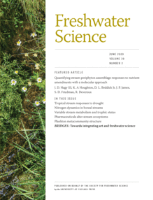
Freshwater Science
Connecting Researchers for a Thriving Aquatic FutureFreshwater Science is a pivotal journal published by the University of Chicago Press, dedicated to advancing the understanding of freshwater ecosystems and their biodiversity. With an ISSN of 2161-9549 and an E-ISSN of 2161-9565, this journal has been a vital resource in the fields of Aquatic Science and Ecology, consistently ranked in the Q2 quartile across multiple categories in 2023. The journal encapsulates rigorous research and innovative studies aimed at addressing the ecological dynamics of freshwater environments from 2012 to 2024. Researchers and practitioners benefit from its open access options, which enhance the dissemination of knowledge while contributing to a better understanding of aquatic systems. With Scopus rankings that place it in the top 30% of its fields, Freshwater Science plays an influential role in fostering scientific dialogue and collaboration among professionals, making it an essential publication for anyone invested in freshwater conservation, management, and ecological impact.

BIOLOGY AND FERTILITY OF SOILS
Enhancing Soil Ecosystems Through Rigorous ResearchBIOLOGY AND FERTILITY OF SOILS, published by Springer, is a leading international journal dedicated to advancing the field of soil science with a focus on the intersection of biological processes and fertility management. With its ISSN 0178-2762 and E-ISSN 1432-0789, this journal serves as a key resource for researchers and professionals alike, reflecting its esteemed status in the community, evidenced by its Q1 rankings in Agronomy and Crop Science, Microbiology, and Soil Science. Covering a broad range of topics from soil health to sustainable agricultural practices, the journal's significant impact factor underscores its critical role in driving innovative research in the domain. While not offering Open Access options, it features rigorous peer-reviewed research that spans decades, converging influential studies from 1985 to 2024. Located in Germany with offices in the United States, the journal maintains a strong international presence, providing insights that enhance the understanding and management of soil ecosystems crucial for sustainable agriculture. Researchers aiming to expand their knowledge on soil biology and fertility will find this journal an invaluable asset.

Biogeosciences
Unveiling the secrets of our planet's biological and geological systems.Biogeosciences, published by COPERNICUS GESELLSCHAFT MBH in Germany, is a prestigious open access journal that has been a leading platform for innovative research since its establishment in 2004. With an impressive impact reflected in its Q1 rankings within both the Earth-Surface Processes and Ecology, Evolution, Behavior and Systematics categories, it caters to a diverse readership encompassing researchers, professionals, and students engaged in the life sciences and earth sciences. The journal's commitment to disseminating high-quality research is evident from its exemplary Scopus rankings, highlighting its role in fostering advancements and discussions in biogeoscience. With full open access options, readers worldwide can freely explore significant findings that contribute to our understanding of ecological and geoscientific principles. As the journal converges into its next decade, it continues to be an essential resource for those seeking to bridge the disciplines of biology and earth sciences.

Limnology and Oceanography Letters
Exploring the dynamics of aquatic environments.Limnology and Oceanography Letters, published by WILEY, is an esteemed peer-reviewed journal dedicated to advancing our understanding of freshwater and marine systems. With an impressive Q1 ranking in both Aquatic Science and Oceanography, this journal has established itself as a pivotal resource for researchers, professionals, and students alike. Since its inception as an Open Access journal in 2016, it has provided unrestricted access to high-quality, innovative research articles that illuminate diverse aspects of aquatic ecosystems and their dynamics. With a publication history from 2016 to 2024 and a significant presence in Scopus rankings—placing it in the top 6% for Oceanography and the top 8% for Aquatic Science, this journal not only fosters scholarly communication but also encourages interdisciplinary collaboration. Addressing pressing issues related to water resource management, climate impact, and ecological integrity, Limnology and Oceanography Letters remains essential for those dedicated to the science of aquatic environments.
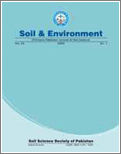
Soil & Environment
Advancing Sustainable Practices for a Healthier PlanetSoil & Environment is a distinguished open access journal published by the University of Agriculture, Institute of Soil & Environmental Sciences, located in Faisalabad, Pakistan. Established in 2006, this journal has become a vital platform for disseminating pioneering research in the fields of Environmental Science and Soil Science. With an ISSN of 2074-9546, it provides a wealth of knowledge through accessible academic articles, particularly focusing on sustainable practices and innovations that impact soil and environmental health. Although currently categorized in Q4 within both Environmental Science (miscellaneous) and Soil Science, the journal is dedicated to enhancing its influence and visibility as it progresses towards convergence years that span from 2010 to 2024. Researchers, professionals, and students will find Soil & Environment an essential resource for staying informed about the latest developments and methodologies in soil conservation and environmental sustainability. By offering publicly accessible content, the journal aims to foster greater collaboration and knowledge-sharing within the global scientific community.
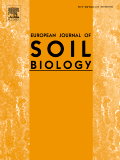
EUROPEAN JOURNAL OF SOIL BIOLOGY
Exploring the Microbial World Beneath Our FeetThe EUROPEAN JOURNAL OF SOIL BIOLOGY is a leading publication through ELSEVIER FRANCE-EDITIONS SCIENTIFIQUES MEDICALES ELSEVIER, renowned for its rigorous contribution to the fields of soil science, microbiology, and insect science. Established in 1993 and continuing to thrive until 2024, this journal is recognized for its high academic standards, achieving a prestigious Q1 ranking across multiple disciplines including Insect Science, Microbiology, and Soil Science in 2023. With a Scopus rank placing it in the top tiers of relevant categories, the journal serves as a vital platform for disseminating groundbreaking research and advancements in soil biology. Although currently not an open access journal, it offers valuable insights to researchers, professionals, and students, enhancing understanding and fostering innovative solutions for global soil health challenges. The journal's ISSN is 1164-5563 and its E-ISSN is 1778-3615, offering a wealth of knowledge from an esteemed publisher situated in France.
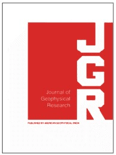
Journal of Geophysical Research-Biogeosciences
Pioneering Research on Ecosystem Health and Environmental Change.Journal of Geophysical Research-Biogeosciences, published by the American Geophysical Union, is a premier academic journal dedicated to advancing our understanding of biogeochemical processes and their interactions within Earth's systems. With an impressive impact factor reflective of its rigorous peer-review process and outstanding scholarly contributions, the journal ranks in the Q1 quartile across a multitude of essential categories, including Aquatic Science, Atmospheric Science, Ecology, Forestry, Paleontology, Soil Science, and Water Science and Technology, highlighting its significance in multidisciplinary research. Researchers, professionals, and students alike will find invaluable insights and comprehensive studies that facilitate a deeper understanding of environmental changes and ecological dynamics. For those interested in open access options, it provides valuable networking among leading experts in the field, especially for collaborative research that aims to address critical global challenges related to climate change and ecosystem health. This journal serves as a key resource for anyone involved in geophysical and biogeosciences, making significant contributions toward the sustainability and management of Earth's biogeochemical cycles.

Inland Waters
Elevating Understanding of Critical Freshwater IssuesInland Waters, published by TAYLOR & FRANCIS LTD, stands as a prestigious scholarly journal dedicated to the critical examination of freshwater ecosystems and their management. With an ISSN of 2044-2041 and an E-ISSN of 2044-205X, this journal boasts a remarkable Q1 ranking in both Aquatic Science and Water Science and Technology for 2023, reflecting its significant impact in the field. Researchers and professionals can benefit from its comprehensive coverage of cutting-edge research, methodological advancements, and policy implications concerning inland waters. Committed to disseminating valuable knowledge in a vital area of environmental science, Inland Waters aims to foster collaboration and promote innovative solutions for sustainable water management practices. As it continues through its converged years from 2012 to 2024, the journal remains an essential resource for those dedicated to advancing our understanding and stewardship of freshwater environments worldwide.
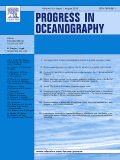
PROGRESS IN OCEANOGRAPHY
Innovating Ocean Research for a Sustainable FuturePROGRESS IN OCEANOGRAPHY is a pivotal journal published by PERGAMON-ELSEVIER SCIENCE LTD, dedicated to advancing the field of oceanographic research and exploration. With an ISSN of 0079-6611 and an E-ISSN of 1873-4472, this esteemed publication has been disseminating significant findings from 1963 and continues to be a cornerstone in aquatic sciences and geology, holding a distinguished Q1 ranking in both categories as of 2023. The journal primarily focuses on innovative research that contributes to our understanding of ocean processes, marine ecosystems, and the impact of human activities on the oceans. Its exclusive access model facilitates the dissemination of high-quality content that resonates with researchers, professionals, and students alike, ensuring that vital insights are accessible to the global scientific community. With a firm commitment to upholding rigorous scientific standards, PROGRESS IN OCEANOGRAPHY remains an influential platform for the communication of groundbreaking research, providing scholars with invaluable resources to drive future oceanographic studies.
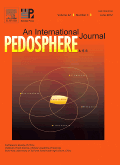
PEDOSPHERE
Pioneering Insights into Soil EcosystemsPEDOSPHERE, published by SCIENCE PRESS, is a leading journal in the field of Soil Science, holding a prestigious position in the Q1 category as per the latest evaluations, reflecting its high impact and relevance in the domain. Established in 1996, this journal is committed to advancing our understanding of soil-related processes and their interactions with various environmental components, providing a platform for innovative and high-quality research. With an impressive rank of #13 out of 159 in the Scopus classifications for Agricultural and Biological Sciences, PEDOSPHERE reaches the 92nd percentile, indicating its significance among scholarly publications. Although the journal operates under traditional access options, it remains an essential resource for researchers, professionals, and students keen on exploring the complexities of soil dynamics and sustainability. By bridging interdisciplinary methodologies and fostering collaboration, PEDOSPHERE plays a vital role in addressing global challenges related to soil management, conservation, and ecological balance.